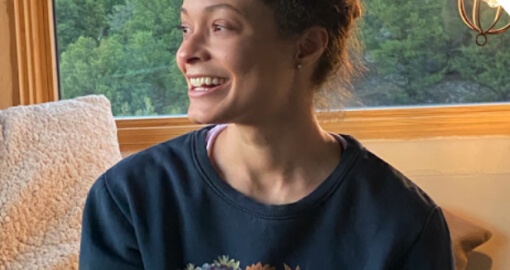Written by Shannon,
Brightside Health
8 Minute Read

Medically reviewed by:
Erin O'Callaghan, PHD
Director of Therapy
10 Minute Read

If you struggle with anxiety and panic attacks, you know the discomfort all too well. Panic attacks, which are sometimes colloquially referred to as anxiety attacks, can cause a variety of symptoms and may manifest differently for different people.
Anxiety itself can be very hard to manage and get control over, and when panic attacks come into the picture, too, things can feel that much more overwhelming and draining. That said, there are several ways that you can try to manage a panic attack, and practicing certain coping techniques can help.
Certain methods of anxiety and stress reduction may also help prevent panic attacks from happening in the first place, or at least reduce the frequency and intensity. This is your ultimate guide to stopping panic attacks.
Want to speak 1:1 with a licensed expert about anxiety or panic? Start with a free assessment.
Want to speak 1:1 with an expert about your anxiety & depression?
Why Do Panic Attacks Happen?
Before we talk about what you can do to stop a panic attack, it is important to talk about some of the basics. Understanding what a panic attack actually is and why it happens may help you more easily accept your struggles as they come.
Anxiety happens when you are under stress, feeling tension, having worrisome thoughts, or experiencing certain physical symptoms like heart palpitations, shortness of breath, or feelings of being detached from oneself.
The worries associated with anxiety can be about really anything, including school, work, friends, family, or relationships. While some degree of anxiety and worry is a normal part of everyday life, persistent symptoms may indicate an anxiety disorder.
More intense physical manifestations of anxiety are considered panic attacks, and an attack can last for several minutes or even several hours.
The specific symptoms that a person experiences during a panic attack can vary, and in fact, different people may experience entirely different symptoms. No two people are exactly the same, and panic attacks can manifest in many different ways.
What does an anxiety attack feel like?
Some common symptoms associated with a panic attack include:
- Heart palpitations
- Nausea
- Abdominal pain
- Sweating
- Chest pain or discomfort
- Trembling or shaking
- Feeling dizzy or lightheaded
- Sensations of shortness of breath
- Feelings of choking
- Feelings of being detached from oneself
- Fear of losing control
- Fear of dying
Panic attacks typically begin suddenly, without warning and they can strike at any time. You may have occasional panic attacks, or they may occur frequently. If you have recurring panic attacks and worry about future panic attacks, you may have panic disorder.
Panic attacks may come on suddenly and without warning at first, but over time, they’re usually triggered by certain situations.
For some people, a panic attack might not look like anything more than a moment of zoning out. Even in cases where symptoms are not physically apparent, anxiety could still be wreaking havoc internally.
Panic attacks can be draining and disheartening, and experiencing them regularly can certainly take a toll on your physical and mental well-being. There are several different strategies that can help you regain control over your anxiety, and may help you stop a panic attack in its tracks.
What to do when a panic attack strikes: 10 ways to cope
When you begin to feel a panic attack coming on, it may be scary, frustrating, or downright infuriating. Getting a handle on your anxiety can be tough.
These ten strategies, which you can use during an anxiety attack, may help you stop a panic attack in its tracks and even prevent them from happening in the future:
Get moving
Going for a walk, a run, or finding some other way to move your body may be a great way to clear your head and relax. Doing this outside is even better because exercising outdoors also provides access to higher levels of vitamin D from the sun, increases in revitalization, satisfaction, and positive engagement as well as decreases in tension, confusion, anger, and depression.
Listen to music or turn to one of your passions
Listening to music, or turning to another one of your favorite hobbies or passions, is another great way to distract your brain and calm yourself down. Doing something you love or enjoy can also help get you into a more relaxed and positive headspace.
Meditate
Meditating is a mindfulness practice that may help you get more in touch with your mind and body, and mindfulness, in general, may be a great way to increase self-awareness, imagination, creativity, patience, tolerance, sleep quality as well as decrease stress, negative emotions, resting heart rate, and blood pressure.
Focus on your breathing
When you feel anxious, pausing everything and taking a few moments to take some slow, deep breaths can help you calm your body down.
Try taking a DEEP breath in through your nose. Breathe in as deeply as you can and as slowly as possible. Then exhale through your mouth just as slowly. Try breathing in and then out to a count of five, then repeat.
Stay connected
Anxiety can be isolating, and staying connected with friends, family, or other loved ones can help remind you that you have a support network of people who are here to help you get through the hard times.
Talk it out
Confiding vulnerable information with a trusted loved one about whatever is making you anxious can be a helpful way to process through your own reactions and consider fruitful next steps. When we keep things bottled up within ourselves, we may ruminate about what went wrong without actually making any progress on how to respond to the anxiety-provoking situation.
Try grounding techniques
Using your senses to ground yourself can bring you back to the present moment and get you out of your head. You can do this by engaging all of your senses—pay attention to your surroundings and mindfully notice the things that you can see, hear, smell, taste, and touch.
Maintain a regular meal schedule with well-balanced nutrition
Skipping meals or not eating well-rounded meals can aggravate symptoms of anxiety, so make sure you are properly nourishing your body throughout the day. The more we make purposeful decisions about what we consume, physically or otherwise, can help us make more value-guided choices.
Make sure to get enough sleep
Sleep hygiene is an important part of your overall health and well-being. While you are sleeping, your body works hard to replenish and restore itself. To help improve your sleep, create a relaxing routine before you go to bed. Perhaps, you read for a few minutes, meditate, or listen to calming music. Try to turn off all electronics at least 30 minutes before bedtime.
Having a sleep routine and a regular schedule can help your body wind down for bed at an appropriate time and regulate your circadian rhythm. Removing bedtime distractions like phones or other “blue light” emitting devices can also facilitate a night of more restful sleep.
Turn to a professional
Anxiety can be unpredictable, discouraging, and frustrating, and it can also be extremely hard to manage on your own. That’s when it’s a good idea to seek help. When everyday anxiety becomes increasingly intense or difficult to manage, you may be experiencing an anxiety disorder and self-care techniques may not be enough to help you feel better. A licensed mental health professional can work with you to come up with a personalized treatment plan to help you feel better.
With Brightside Health, you can access care from the comfort of your home with evidence-based therapy and precision medication tailored to your needs.
The Bottom Line
Anxiety can entail frequent, intense worry, fear, and sometimes even physical symptoms that can be hard to control.
Panic attacks happen when anxiety and stress begin to pile up and eventually overwhelm your system, and a panic attack can bring along some pretty uncomfortable symptoms, including a fast heart rate, sweating, and tearfulness. Panic attacks can be discouraging and tough to manage, but certain coping strategies like mindfulness, relaxation techniques, exercise, and taking part in your favorite hobbies may help you calm yourself down.
If you feel overwhelmed or simply want someone to talk to, speak with a mental health professional who can help support you. Anxiety and panic attacks can be signs of an anxiety disorder, and a mental health professional can provide a diagnosis and treatment plan. This is where Brightside Health comes in.
With Brightside, you get matched with a mental health provider who is there to support you every step of the way, giving you the care you need right from the comfort of your home.
Start with a free assessment today.
Sources:
What Is an Anxiety Attack and How Do You Stop One? – Detroit Medical Center
Feeling anxious? Here are 10 things you can do to calm your fears – Indiana University Health
Anxiety & Panic Attacks: Symptoms & How To Stop a Panic Attack – University of Michigan




















